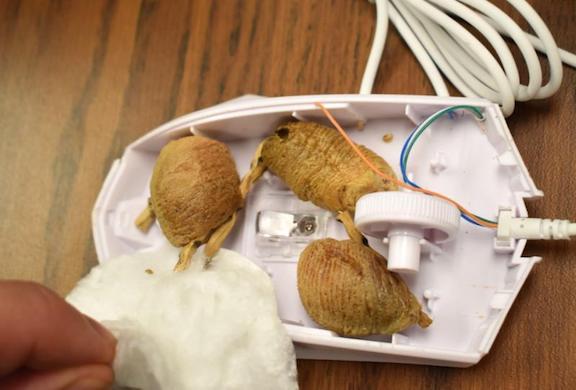U.S. Customs and Border Protection agriculture specialists in Philadelphia have seen many insects, mostly as hitchhikers stowing away on a produce shipment or burrowed into wood packaging material, but finding mantis eggs inside a computer gaming mouse is a first.

CBP officers initially x-rayed a parcel on August 7 that was manifested as a wireless computer gaming mouse from Spain and detected anomalies inside the computer mouse. Officers examined the mouse and discovered three brown sacks and a live insect concealed inside the mouse. Officers preserved the sacks and insect inside a sealed evidence bag and turned it over to CBP agriculture specialists.
Mantis are present in the United States and are not an endangered species. The U.S. Department of Agriculture (USDA) Animal and Plant Health Inspection Service (APHIS) regulates the importation of live insects into the United States. Importers are required to attain permits and meet requirements for importing live insects.
CBP turned the live mantis and egg masses over to the U.S. Fish and Wildlife Service on August 13. USFWS are working to place the live mantis with the Academy of Natural Sciences museum in Philadelphia.
The parcel was destined to an address in Hillsborough County, N.H.
“This seizure illustrates the exceptional inspection capabilities of Customs and Border Protection officers to detect unusual and creative concealment methods to intercept illicit smuggling attempts at our nation’s borders,” said Casey Durst, CBP’s Director of Field Operations in Baltimore. “CBP officers and agriculture specialists serve with extraordinary commitment and vigilance every day to protect our nation, our economic security and our citizens against all potential threats.”
CBP agriculture specialists are charged with the challenging task of safeguarding our nation’s agricultural resources by examining international trade shipments and traveler baggage every day for invasive insects, federal noxious weeds, and plant and animal diseases. They have extensive training and experience in the biological sciences and agricultural inspection.
During a typical day last year, CBP agriculture specialists across the nation seized 4,695 prohibited plant, meat, animal byproducts, and soil, and intercepted 314 insect pests at U.S. ports of entry. See what else CBP achieved on a typical day during 2019.









